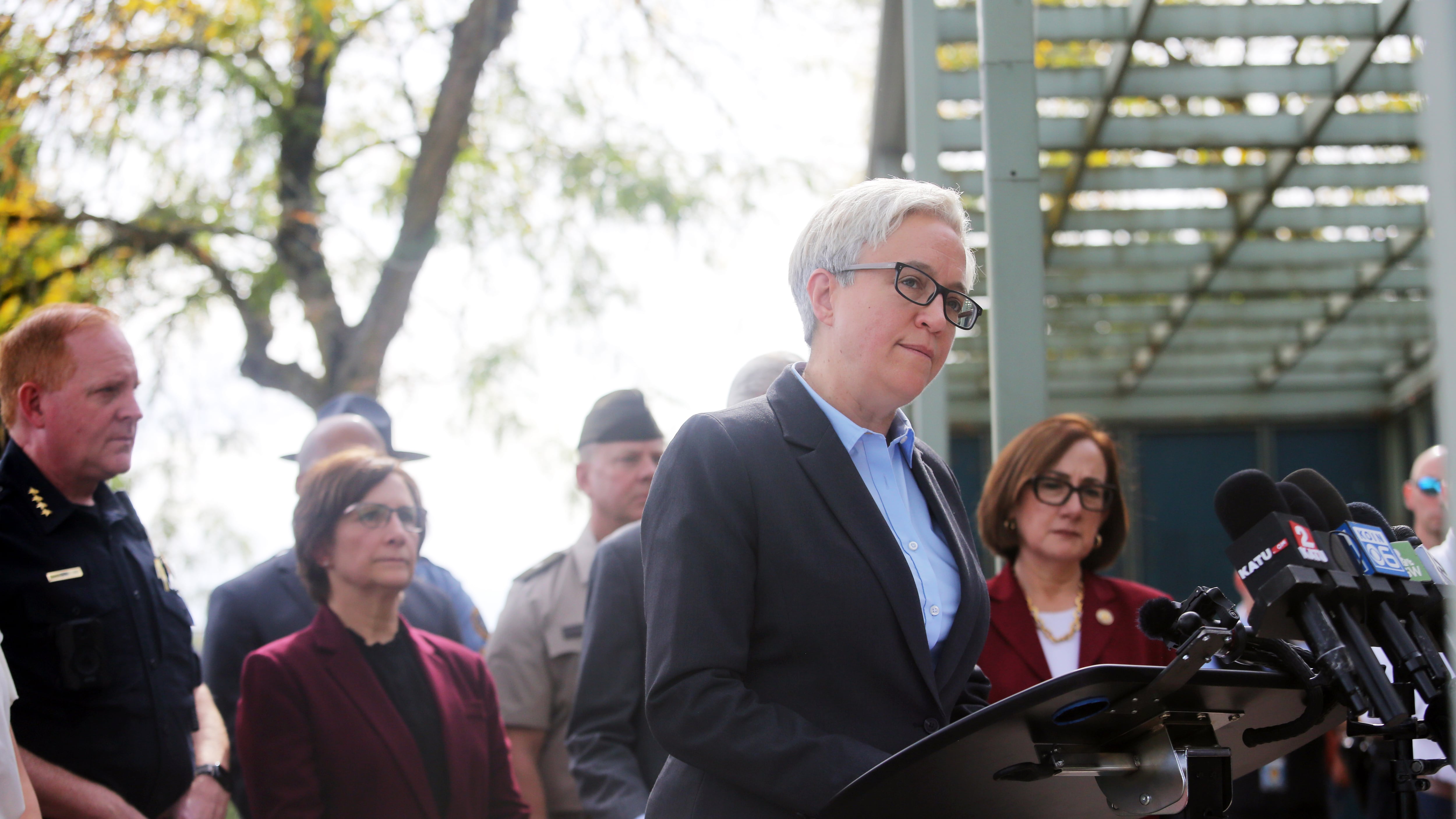Gov. Tina Kotek says she spoke to President Donald Trump midday Saturday “as one executive to another,” and told him there was no reason to carry out the plan he announced hours before to send U.S. troops to protect Portland and its U.S. Immigration and Customs Enforcement facility.
“My conversation with President Trump was trying to understand his rationale,” she recalled of the conversation, “and I believe it is based on information that is not accurate today. There are protests here. But it is not what we saw during the pandemic, where we had significant violent protests. I told him that. He thinks there are elements here that are creating an insurrection. I told him there is no insurrection here, and that we have this under control.”
Trump, she said, responded, “Let’s keep talking.”
Kotek recounted the exchange in a press conference on a pleasant autumn afternoon that seemed designed to prove her point about Portland not being so bad as it’s made out to be.
Bikers biked. Strollers strolled. The Willamette River flowed under the Hawthorne Bridge in the background. And local, state and congressional officials stood together at Tom McCall Waterfront Park to signal their collective opposition to Trump’s announcement Saturday morning that he was authorizing a U.S. military mission to protect Portland from “Antifa, and other domestic terrorists”—and that he would authorize “full force,” if necessary.
Two miles south, at the ICE facility on South Macadam Avenue at Bancroft Street, about two dozen protesters milled outside the federal building. Few were masked. Demonstrators had stacked boxes of doughnuts and cases of Gatorade along the sidewalk. One man wore a chicken suit and waved a sign reading, “Portland will outlive him,” to passing traffic.
It’s this location that has regularly seen nighttime skirmishes between federal officers and protesters since June. It’s those small-scale clashes that caused Republicans, including Oregon House Minority Leader Christine Drazan, to hail the potential deployment of troops as an action long overdue after local authorities failed to allow ICE to operate unmolested.
At 1:36 pm, the chief Pentagon spokesperson told WW, “We stand ready to mobilize U.S. military personnel in support of DHS operations in Portland at the president’s direction.” About an hour later, local officials at the press conference in downtown Portland said they were not aware of any federal troops deployed in Oregon at the behest of Trump, nor should there be.
“I believe the president does not have the authority to deploy federal troops on state soil,” Kotek said, adding that she’s coordinating with Oregon Attorney General Dan Rayfield to see if any response is necessary. “And we will be prepared to respond if we have to.”
Officials had held an earlier press conference at a Portland church Friday night to warn of increased federal law enforcement activity in Portland and what it might portend—and they urged Portlanders not to take the bait as the Trump administration sought a pretext for a broader crackdown.
Still, Trump’s Saturday morning post on his social media platform appeared to land as a surprise. Kotek said she awoke to the post, just like every other Oregonian.
In the post, Trump said he was directing “Secretary of War, Pete Hegseth, to provide all necessary Troops to protect War ravaged Portland, and any of our ICE Facilities under siege from attack by Antifa, and other domestic terrorists.” He said the move came at the request of Homeland Security Secretary Kristi Noem.
Kotek she said the White House had not communicated with her office before she reached out. She spoke with Noem at 9:55 am for 12 minutes, said Lucas Bezerra, a spokesman for the governor. At 12:20 pm, Bezerra said, Kotek spoke with Trump himself in a call that lasted seven minutes.
Kotek recalled that she tried to understand Trump’s reasoning for his announcement. And she said she told him that “we are taking care of it”—that she had faith in Portland police to manage the city’s public safety needs, and enforce the law when protesters crossed the line into violence or illegal activity.
Still, at the press conference, she added, “I also want to say that we all have a responsibility to speak our voices, lift our voices, speak our political truth peacefully.” Oregonians, she said, have been doing that peacefully and lawfully for months.
She said she has been in contact with Govs. JB Pritzker of Illinois and Gavin Newsom of California to learn from their experiences when Trump sent or threatened to deploy U.S. troops to their states without their consent.
“Any federal takeover with military troops in our state is a threat to communities across Oregon,” she said. “It violates our right to govern ourselves. It interferes with local law enforcement’s ability to fulfill their mission. Frankly, it drains taxpayer resources that could be better spent elsewhere. And again, I communicated that to the president directly. Oregon is our home. It is not a military target.”
Military servicemembers should be dedicated to real emergencies, she added, and Portland was safe and calm. She described students going to see The Lion King at the Keller Auditorium, Timbers fans revving up for a match, people going to work at restaurants. She said she told Trump of this reality.
Portland has its challenges, she added, with people worried about schools and affordability and jobs. She said she would welcome federal help for things like that.
Her rhetoric largely matched what Mayor Keith Wilson said the night before at Westminster Presbyterian Church. The mayor said Portland could use all kinds of help, but “if the federal government didn’t come here to lend us a hand, then take a hike.”

